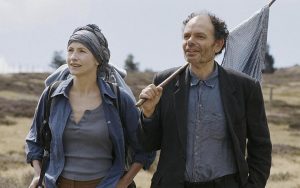A Festival to Celebrate Women in Cinema

The Festival Internazionale di Cinema e Donne (Women’s International Film Festival) is a five-day event of Italian as well as foreign film and documentary screenings. (Cinema La Compagnia, via Cavour 50/r) Beginning on November 8 through to 12 it will provide an opportunity for audiences to appreciate the importance of female roles – glimpsed through stars, directors and storylines – in a male-dominated cinematic world. All films will be shown in their original language with either English or Italian subtitles.
Among the group of women represented in the festival, is Coline Serreau, one of France’s greatest directors. Her films look back on women led rebellions during the 70s, such as Mais qu’est-ce qu’elles veulent? created through a series of interviews with women, of different ethnicities, retelling their life situation at the time. (Nov. 8, 3:30 pm)
The evening of Nov 8, will kick-start with the first Italian preview of the director’s film, Saint-Jacques… La Mecque (9 pm). The story describes the pilgrimage of three brothers who walk the length of the Santiago de la Compostela route, in the hope of collecting their conspicuous inheritance left by their mother.
The Sigillo della Pace will be awarded to Serreau following the film screening, the only official accolade in the world, recognising female directors and producers who have created leading movies centred around war, racism and particularly female oppression.
Dominique Cabrera, also part of the line-up, is known for her big screen documentaries. Rester là-bas (stay there), Ici là-bas (Here: France, 1987, there: Algeria, 1963) and Ranger les Photos are three short documentary films created through portrait photographs of pied noirs (persons of European origin who lived in Algeria during French rule) who untraditionally, decided to stay in Algeria after independence. Cabrera transports us to her native land, on a voyage to discover her distant relatives that never left the other side of the Mediterranean. Showings of the three films will take place on Nov. 10, from 3:30 pm.
Aside from non-fiction documentaries, the Algerian-French director has achieved success with the dramas L’autre côté de la mer (Nov. 10, 9 pm) and Corniche Kennedy (Nov. 9, 9 pm), also centred on the French population in Algeria.
The festival also pays tribute to Italian author Dacia Maraini who has written numerous plays and novels centered on women’s issues. An example of Maraini’s work that particularly stands out is ‘La Lunga Vita di Marianna Ucrìa,’ published in English as ‘The Silent Duchess.’
Set in Sicily during the 18th century, deaf protagonist Marianna, incapable of speech, is forced to marry her 13-year-old uncle; unwilling to comply, Marianna attempts to escape her role as mugghieri (wife) in a world dominated by men and death.
There will be a screening of Io Sono Mia by Sofia Scandurra (Nov. 10, 3:30 pm), a must-see-film and now cult that is worth re-watching time and time again, based on Maraini’s novel, ‘Women at War.’
Six Gilda Awards will be presented, on Nov 12, 9 pm, to those who have most successfully demonstrated awareness to the inequality between men and women on the film scene and the perceptions of women through the media. The categories and their winners this year include; best film (Gipsofila by Margarida Leitão and The Divine Order by Petra Volpe), best actress (Marta Zoffoli), best documentary (Farida Benlyazid and Dounia Benjelloun), most antiviolence film (A Girl of No Importance by Anya Camilleri), most influential career (Dacia Maraini) and best short movie (Journey to Stockholm by Gabriella Rosaleva).
The award is named for Gilda Gradi, the founder and proud owner of Gilda Bistrot in Florence. Gilda created the award to praise women directors, actors and producers, in an industry heavily dominated by the male society.
OTHER FILMS
Petra Volpe, with The Divine Order (Nov. 12, 9 pm), spotlights women who opposed to male supremacy, fighting for the right to vote in 1971 in Switzerland. This Swiss-Italian director has already achieved great success on the Swiss screens, being nominated for seven Film Awards.
O Pássaro da Noite (Nov. 12, 3:30 pm) is a short film (20 mins duration) that follows the performing life of transvestite, Fernando, known as Deborah Krystal. Set in a Lisbon nightclub, the film captures the nightly performances of the protagonist where she exhibits luxurious and flamboyant costumes.
Polish director Michalina Musialik will bring her new animated short film I, The Animal (Nov. 12, 3:30 pm), the plot is an allegory for the birth of hatred in Nazi uniform; three friends play an innocent game in which one takes the role of a pig and becomes the target of aggression.
But My Love Does Not Die (Nov. 9, 3:30 pm), is a mute film directed by Mario Caserini. Considered among cinematographers as one of the most important and significant silent movies in Italy of all time and is the debut for Lyda Borelli, actress and diva of mute Italian cinema.
Fall in love with this spectacular film, when two characters, meet quite by chance. Elsa Holbein, is the daughter of Colonel Julius, who commits suicide following the accusation of treason under Wallestein’s regime. Elsa is then exiled and begins her singing career under the pseudonym, Diana Cadouleur, when she meets the Heir of the Duke, Prince Massimiliano.
WHAT ELSE TO EXPECT
Women and Berber Music (Nov. 9, 3:30 pm), a dance and ethnic cinematographic show presented with North African dancers, detailing the importance of this particular tradition that has been part of their cultural heritage for more than a millennium.
This will be followed by showings of short video clips such as the suffragette march through London that took place in June 1910 as well as the 1909 women’s voter demonstration in Newcastle.
Tickets cost €7 per person per day or alternatively a €30 pass is available for the five days.
For more information and to see the full programme of movies visit Cinema e Donne website. (karen gee)
